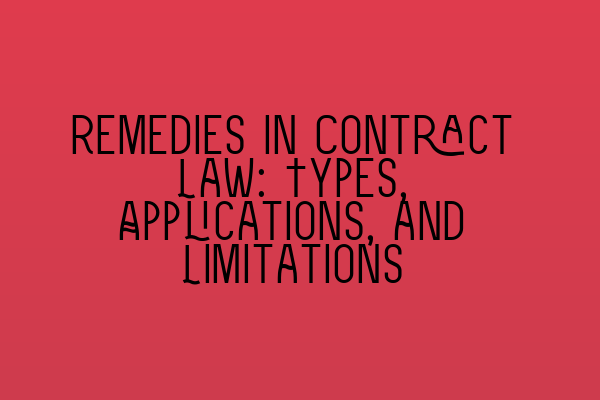Remedies in Contract Law: Types, Applications, and Limitations
Introduction:
In the world of business, contracts are the backbone of every successful transaction. However, on rare occasions, disputes and breaches of contract can arise, leading to a need for legal remedies. When contracts are not honored, the injured party may seek remedies to either compensate for the loss suffered or enforce the original terms of the agreement. In this blog post, we will explore the various types of remedies available in contract law, their applications, and their limitations.
1. Damages:
Damages are the most common remedy sought in contract disputes. They aim to compensate the injured party for the loss they have suffered as a result of the breach. There are several types of damages available:
a. Compensatory damages: These are designed to put the injured party in the position they would have been in if the contract had been performed correctly. They include both direct and indirect losses incurred.
b. Consequential damages: These are meant to compensate for losses that were not directly caused by the breach but were reasonably foreseeable by the breaching party at the time the contract was made.
c. Punitive damages: In some rare cases, punitive damages may be awarded to punish the breaching party for their actions and deter others from similar behavior. However, these are not common in contract law and are subject to specific limitations and requirements.
d. Nominal damages: When only a technical breach has occurred, nominal damages may be awarded, typically in recognition of a legal right violated rather than actual loss suffered.
2. Specific Performance:
Specific performance is a remedy that requires the breaching party to fulfill their contractual obligations as originally agreed upon. This remedy is most often sought when the subject matter of the contract is unique or when monetary compensation would not adequately remedy the injured party. However, specific performance is not available for all types of contracts, as it requires the court’s ability to supervise and enforce the performance.
3. Rescission and Restitution:
Rescission is a remedy that cancels the contract and restores the parties to their pre-contractual positions. This is typically sought when a contract is voidable due to misrepresentation, duress, undue influence, or mistake. Restitution, on the other hand, involves returning any benefits received under the contract. Courts may order rescission and restitution together or separately based on the circumstances of the case.
4. Injunctions:
Injunctions are court orders that prevent a party from taking certain actions or require them to take specific actions. They are sought when monetary remedies are inadequate or when there is a need to prevent irreparable harm or maintain the status quo. In contract law, injunctions can be used to stop a party from breaching the contract or to compel them to perform specific obligations.
Limitations:
It is important to note that remedies in contract law come with certain limitations and requirements:
– Mitigation: The injured party has a duty to mitigate their losses and minimize damages as much as possible. Failure to do so may limit the amount of compensation they can recover.
– Foreseeability: Damages must be reasonably foreseeable at the time of contract formation. Parties cannot claim damages that were not reasonably foreseeable by the breaching party.
– Causation: There must be a direct causal link between the breach of contract and the loss suffered. The injured party must be able to prove that the breach directly caused the damages claimed.
– Uncertainty: Damages cannot be speculative or uncertain; they must be reasonably calculable or provable.
Conclusion:
Remedies in contract law play a crucial role in resolving disputes and bringing parties back to a fair position. Whether through compensatory damages, specific performance, rescission, or injunctions, the goal is to restore the injured party’s rights or compensate for their loss. However, it is important to keep in mind the limitations and requirements that govern these remedies. Understanding the types of remedies available and their applications is essential for navigating contract disputes and ensuring fair outcomes for all parties involved.
By providing a comprehensive overview of remedies in contract law, we hope to have shed light on this complex topic and empowered businesses and individuals to make informed decisions when faced with contractual breaches.
